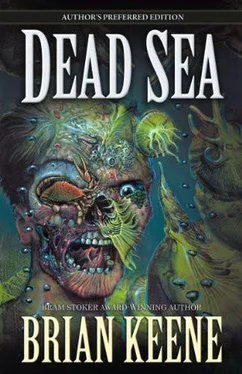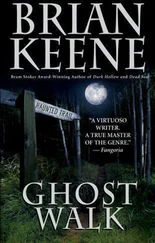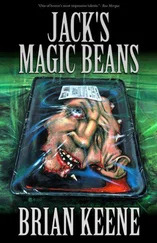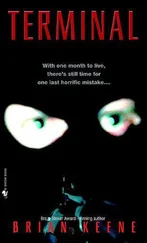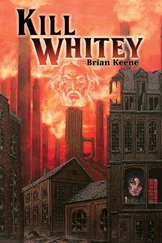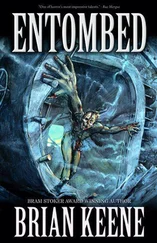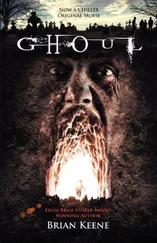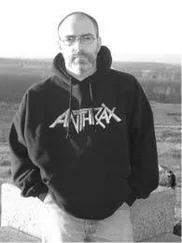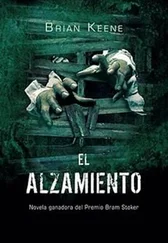“What now?” Carol shouted over the roar of the storm.
I glanced around, and caught movement out of the corner of my eye. I raised the shotgun, but it was only Chief Maxey, carefully working his way down from the pilothouse. He held tight to the handrails as the ship twisted again. He was carrying a small radio, and struggled not to drop it.
“GPS,” he said, holding the radio up for us to see. “Global Positioning Satellite. Believe it or not, the damn thing is still working. I guess the satellite is still floating around up there, just waiting for somebody to tell it what to do. I’ve programmed in the coordinates for the drilling platform. We should reach it by morning.”
“Morning?” Carol looked startled. “So we have to be on the ocean all night?”
“We have no choice, Mrs. Beck,” the chief said. “You can remain onboard if you wish, but I’m certainly not staying here. If you come with me, I promise I’ll do my best to see to your safety.”
I wiped rain from my eyes. “I thought the captain was supposed to go down with the ship.”
“I’m not a captain, Mr. Reed.” He smiled. “I’m a signalman chief. And besides, the women and children are getting on first. Now let’s ready the lifeboat.”
Chief Maxey directed us on what to do. As we prepped the lifeboat, I noticed that Runkle kept wincing, as if in pain. He seemed to be favoring his left side.
“You okay?” I asked.
“Side stitch,” he gasped. “Too much excitement for one night. I just need to walk it off.”
The chief tapped me on the shoulder. “We’ll need a few supplies. Enough water and food to last us for a few days. Want to give me a hand carrying it?”
“Sure.”
We left Runkle behind to protect Carol and the kids and made our way to the galley. The ship was listing even worse now. We could hear the hull groaning as the intense pressure split it open wider. Black smoke belched from the open hatches.
Tasha had said that some of Tran’s fingers were missing. We found them in the galley, lying on the floor in a pool of blood along with his wedding ring. I’d never even noticed the ring on his finger before, hadn’t bothered to learn anything about him—and now I never would. Again, I felt sorry for Tran. Dying was bad enough. Dying and becoming a reanimated corpse was even worse. But somehow, his anonymous death seemed the worst of all. What was Tran’s monomyth? What kind of archetype was he—the forgotten one? The sacrificial lamb? The movie extra? The red shirt, like on Star Trek —destined only to provide cannon fodder?
I put my fingers to my lips and motioned for the chief to come closer.
“Runkle said he took care of Murphy. The professor must be around here somewhere. Be careful.”
He nodded. We moved into the dry goods compartment. I went first, the shotgun ready and loaded. The walk—in locker was deserted. Quickly, we each grabbed a burlap sack that had once held potatoes and stuffed them with as many water jugs and packages of food as we could carry. Then we slung the sacks over our shoulders and made our way back out into the storm.
“Did you find the professor?” Runkle asked when we got back on deck. He sounded out of breath.
“No,” I said. “Any sign of him out here?”
“Nothing. And like I said, I took care of Murphy earlier. Didn’t see the old man, though.”
Another tremor rocked the ship, knocking Malik and Carol to the deck. The waves crashed over the handrail, which was now facing the ocean. Lightning flashed across the sky.
“We’re out of time,” Chief Maxey said. “You’re both absolutely positive that no one else is left alive onboard?”
Runkle and I both nodded.
“Then I suggest we go. Carol and the children first. Then you gentlemen.”
We climbed into the lifeboat and Chief Maxey started the winch while I stored our supplies in a dry spot beneath a bench. I noticed the chief taking one last look around. He seemed close to tears. The winch’s gears and pulleys squeaked as the boat began descending toward the ocean’s choppy surface. As we sank lower, the chief jumped aboard. The ropes swayed from his added weight and the lifeboat crashed against the side of the ship. Carol screamed and the rest of us held on tight. There were six of us and four life vests. Runkle declined his, and the chief insisted I take the spare. The others went to Carol, Tasha, and Malik. Once the lifeboat had splashed into the water, the chief released the ropes and started the motor.
“Thank God we refueled after your trip to the rescue station,” he said. “Or else this would be a very short trip.”
We pulled away from the Spratling, and I got a good look at the hole in her side. It was huge—twisted, blackened steel stuck out like jagged teeth. Wave after wave surged through the gash, flooding the interior. Almost half the vessel was beneath the surface now, and I wondered if there were fish swimming around in the passageways. The stern tilted up into the air. Water cascaded off it in sheets. Thick, black smoke and orange flames erupted from a bilge pipe.
“Jesus Christ,” I whispered. “Look at it.”
The bow nose-dived for the ocean floor and the stern rose higher. The Spratling sat in the water like an arrow. We continued retreating from the sinking ship. Chief Maxey pushed hard on the throttle and increased our speed. Despite the rain, oil fires were beginning to cover the ocean’s surface. A whirlpool swirled around the wreckage, sucking in some floating debris that had slid off the flight deck.
“Look!” Malik stood up and pointed. The boat rocked from the sudden movement, startling us all.
“Malik,” Carol scolded. “Sit down before you capsize us.”
“But it’s Professor Williams.”
We all looked where he was pointing. Sure enough, the Professor’s undead corpse was bobbing up and down in the water, caught up in the churning whirlpool. His arms flailed uselessly, almost as if he were waving good-bye. And then he was gone, sucked beneath the surface. Grief tugged at my heart. I’d liked the old man. I would never be able to smell pipe tobacco again without thinking of him. But even in my sadness, I knew that he was gone long before this. He’d died when the fish infected him.
Soon the Spratling slipped beneath the waters as well. Huge bubbles burst on the surface, marking its departure.
Tears welled up in Chief Maxey’s eyes as he watched it sink.
“There goes everything I’ve ever had,” he said. “My entire life was tied up in that ship. It gave me a purpose. The best friends I ever had were the guys I served with onboard her. We were so young back then. Good bunch of guys. The absolute best. They were the salt of the earth. I haven’t spoken to any of them in years, but I used to think about them all the time. Never knew what happened to any of them after they got out. I guess it’s like that for most military personnel. You serve together, live together closer than most folks live. Bonds are formed—unbreakable bonds that are hard for a civilian to understand or appreciate. You rely on those guys for your very life. You trust them in ways you will never trust another person, including your spouse or children. But then, when it’s all over, you lose touch with each other. I tried writing to some of them and got a few letters back—the occasional Christmas card or pictures of their children. But over the years we all lost touch with one another. Ran out of things to talk about, I guess. Seemed like all we did was reminisce about the old days. When the maritime museum hired me to serve as the curator and tour guide, I had lots of time to think about them. That ship was haunted. I saw ghosts around every corner.”
“Ghosts?” Malik asked, sitting back down.
Читать дальше
